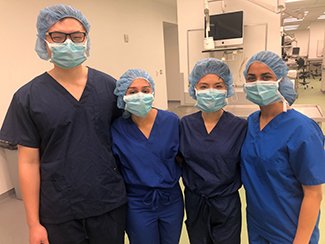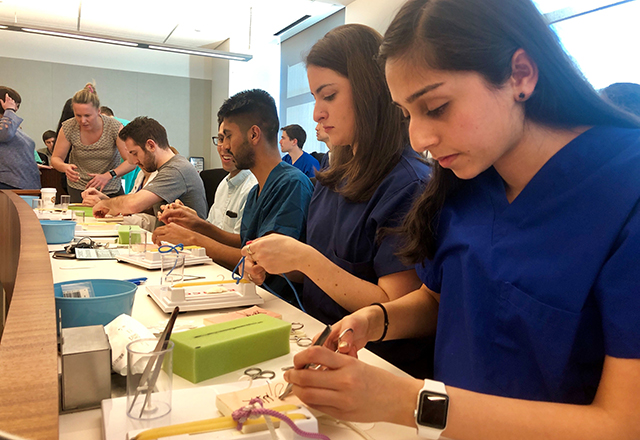By Neha Anand
On Friday, my classmates and I completed our last preclinical unit of medical school. After a year and a half of lecture learning and small groups about the intricate physiology of the kidneys, detailed pathways of the brain and so much more, we finally came to one of the most immersive classes of our first two years of medical school: Transition to the Wards, otherwise known as TTW.
The goal of the three-week course is to prepare us for what to expect when we step foot in the hospital as part of a clinical team during our third year. Before I entered medical school, I had a very limited idea of what my role as a medical student would entail. I could never imagine that I’d learn to take an arterial blood gas sample or give a patient presentation in SOAP note form. Even after acquiring a repository of information about diseases and drugs the first two years, I struggled to understand how exactly I would apply it to patient care during rotations.
Even more, while I have definitely felt excitement to take care of patients, I have also felt fear the past few months. In the next year, I will most likely witness my first patient death, learn to live with mistakes of my limited training and adapt to long hours on my feet with less sleep. What terrifies me most of all is having a shared responsibility over a human life. However, after TTW, I have felt that fear tip more toward excitement.
I specifically enjoyed how TTW covered a multitude of topics, from learning how to suture and discussing ethical situations to practicing pre-rounding, debating medico-legal cases and shadowing other health care team members like social workers and dieticians.
 One of my favorite sessions was learning how to place an IV catheter, first in manikin arm models and then with a partnered classmate. We cheered each time a member of our group successfully placed the catheter in the manikin. I so appreciated the supportive environment for a procedure that is quite nerve-wracking the first time. I felt even more nervous to put an IV in not only a real human, but also one of my best friends in medical school. Under the guidance of the instructor, I successfully placed the IV on my first stick. In that moment, I thought to myself, “OK, I can actually do this!” I had learned a skill that could help a patient in the future — the reason I decided to go to medical school.
One of my favorite sessions was learning how to place an IV catheter, first in manikin arm models and then with a partnered classmate. We cheered each time a member of our group successfully placed the catheter in the manikin. I so appreciated the supportive environment for a procedure that is quite nerve-wracking the first time. I felt even more nervous to put an IV in not only a real human, but also one of my best friends in medical school. Under the guidance of the instructor, I successfully placed the IV on my first stick. In that moment, I thought to myself, “OK, I can actually do this!” I had learned a skill that could help a patient in the future — the reason I decided to go to medical school.
Beyond providing an introduction to procedural skills, TTW reinforced to me the importance of patient communication. During an acute care simulation session, a group of us entered a standardized patient room not knowing what to expect. A standardized patient is an actor who plays a patient role in a specific medical scenario we may encounter. Opening the door, we met a man clutching his chest and asking for pain medication, barely able to speak through his shallow breaths. Immediately, some of us tried to soothe the patient while others thought about next steps in his care. However, our lack of training quickly became exposed in the chaos of the simulation. The man grew agitated and angry with us, and we all felt unsettled with how we handled the situation. When we retried the simulation, we had much more defined roles and worked more efficiently. My role was to keep the patient calm — I maintained eye contact with him and told him we would do everything we could to help. His reactions completely transformed, no longer angry and more willing to discuss what he was feeling. From this, I realized how much compassion could change the course of a stressful situation.
TTW has definitely given me more confidence in my potential to learn procedures, work in a team and strive for the best for my future patients. While I still have a lot to learn, I am grateful for the foundation to begin my rotations in a few short months. What I may take away the most from this course is that patients will be my most generous teachers from here on out. Their willingness to let me learn from them during what may be a difficult time in their lives is invaluable. I was touched by what a patient I interviewed during a precepted clinical skills session said to me: “You are like my children. Of course you may learn from me. I only wish you the most success in your careers.” I responded that, by sharing her story with us, she had played a great part in whatever successes may come our way.

Actually, I real impressed by your good learning environment with a lots of pivotal instruments like manikin something that in most of our African medical schools is not available, after all wish you all the best.
Comments are closed.